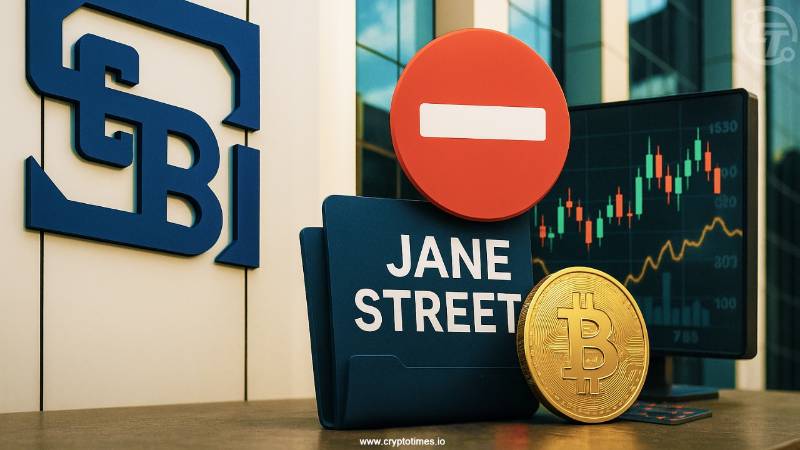What happens when a global financial heavyweight crosses paths with one of the strictest market regulators in the world?
You get SEBI vs Jane Street, a high-stakes, headline-grabbing showdown that is making investors nervous, traders alert, and regulators across the globe pay attention.
This isn’t just a routine regulatory action, it’s a case involving hundreds of millions of dollars, one of the world’s most powerful trading firms, and the future of how global finance interacts with India’s booming markets.
Let’s unpack the story, break down the numbers, and understand why this conflict is a defining moment in the evolution of Indian financial regulation.
What Sparked the Conflict?
In July 2025, the Securities and Exchange Board of India (SEBI) accused Jane Street, a leading global quantitative trading firm, of manipulating Indian bank stocks in order to distort the Bank Nifty index derivatives market.
According to SEBI, Jane Street engaged in a pattern of trades that allowed it to book outsized, allegedly unlawful profits by exploiting loopholes in how the index is calculated, an act SEBI claims amounts to market manipulation.
The penalty?
- A directive to return $550 million in gains
- An immediate trading ban from participating in Indian markets
Jane Street, however, rejected the allegations outright. The firm argued that the trades in question were standard index arbitrage, a legal and globally accepted trading strategy that relies on the natural price differences between an index and its underlying components.
The matter is now headed for a legal showdown in Indian courts, where Jane Street has vowed to challenge SEBI’s order.
Key Financial Figures at a Glance
Let’s put the conflict in perspective by looking at some real numbers:
| Finances | |
| Penalty SEBI Ordered Jane Street to Return | $550 million |
| Jane Street’s Annual Global Revenue | ~$10 billion |
| Market Capitalization of Affected Bank Stocks | ~$300 billion |
| Trading Volume Under Scrutiny | ~$50 billion |
| Bank Nifty Index Movement (Attributed) | ~3% |
| India’s Annual Foreign Investment Inflows | ~$80 billion |
These numbers speak for themselves as this isn’t a small skirmish. It’s a multi-billion-dollar confrontation with potential consequences far beyond Indian borders.
Case Context: What Makes This So Big?
1. One of SEBI’s Largest Penalties Ever
SEBI’s order for Jane Street to return $550 million is among the largest financial penalties ever levied against a foreign firm in Indian market history.
This move demonstrates the regulator's growing assertiveness in policing high-frequency and algorithmic trading practices. It's also a bold signal that SEBI is willing to challenge even the most influential global players if they believe market integrity is at risk.
2. A Financial Blow for Jane Street
Jane Street, despite being one of the largest proprietary trading firms in the world, operates on razor-thin margins in an ultra-competitive space.
The $550 million penalty represents more than 5% of its annual revenue, which is no small dent, even for a $10 billion-a-year firm.
Besides the financial cost, the sudden exit from the Indian market also cuts off a high-growth opportunity for the firm in one of the world’s most dynamic trading environments.
3. A Shock to Indian Market Stability
The Indian bank stocks involved in the case have a combined market capitalization of over $300 billion, making them key components of the country’s financial ecosystem.
Jane Street’s trades reportedly impacted $50 billion worth of transactions, causing significant shifts in pricing and liquidity.
This scale of influence has raised serious concerns about how much power high-frequency traders wield and whether markets can be gamed using complex algorithms that most retail investors don’t understand.
4. A 3% Swing in Bank Nifty Index
The Bank Nifty index, which tracks major banking sector stocks in India, reportedly moved around 3% due to the trades linked to Jane Street.
While 3% might sound small, in financial terms, it's a massive shift for a key index that impacts everything from institutional portfolios to retail derivatives trading.
This has renewed the debate on how much influence individual firms, especially those using automated strategies, can exert on broader market benchmarks.
5. Ripple Effects on Global Investment
India receives approximately $80 billion in foreign investment inflows every year. As the country positions itself as a new global investment hotspot, actions like SEBI’s are being closely monitored by institutional investors and hedge funds.
While some applaud the regulator for upholding fairness, others fear overregulation and unpredictability might discourage foreign participation in India’s capital markets.
Key Stakeholders Involved
Here’s a look at the key players driving and affected by this financial storm:
- SEBI (Securities and Exchange Board of India): The enforcement authority leading the investigation and issuing the penalty.
- Jane Street: The high-frequency trading firm at the center of the allegations, known for using complex algorithms and data-driven trading strategies.
- Indian Exchanges (NSE & BSE): The platforms where the trades occurred and which are now reviewing compliance frameworks.
- Indian Judiciary: Where the case will now unfold as Jane Street challenges SEBI’s actions, potentially creating new legal precedents.
Broader Implications: Why It Matters Beyond Finance
For Indian Markets
This conflict presents a double-edged sword for India. On one hand, it shows that Indian regulators are not afraid to stand up to powerful global firms, which can improve long-term confidence among retail investors.
On the other hand, such strong actions especially if perceived as aggressive or opaque, can raise concerns among foreign investors about regulatory unpredictability.
The immediate aftermath? Increased volatility, growing caution, and an urgent call for clearer, more consistent policies.
For Global Trading Firms
The case is a wake-up call for international trading houses. It highlights the risks of operating in emerging markets where the legal landscape and regulatory norms may differ from those in the U.S. or Europe.
Many firms may now reassess their India strategy, investing more in compliance, legal counsel, and transparency before scaling their operations.
For Regulatory Standards Globally
This situation could also set the tone for cross-border regulatory collaboration. If Indian courts uphold SEBI’s action, it may empower other regulators globally to take similarly bold steps.
It may also push for harmonization of trading norms, especially as markets become more interconnected through algorithmic trading and data-based strategies.
Impact on Jane Street
For Jane Street, this isn’t just about money.
- Financially, they’re looking at a direct loss of over half a billion dollars and the cost of a legal battle in India.
- Reputationally, the case shines a harsh spotlight on its trading methods, ethics, and internal controls.
- Operationally, the firm may need to redesign its compliance and execution models for international markets — especially in jurisdictions with less predictable regulatory systems.
- Strategically, the Indian exit could force Jane Street to refocus on more developed markets, missing out on a region with explosive growth potential.
Conclusion: A Defining Moment in Global Finance
The SEBI vs Jane Street case is more than a legal battle — it’s a turning point in how nations balance market freedom with market fairness.
Will this bold enforcement build long-term trust in Indian financial systems, or will it push innovation and capital away?
As India rises as a global financial power, this case will serve as a reference point for years to come — for regulators, firms, investors, and students alike.


Discussion
Start the conversation
No comments yet
Be the first to share your thoughts on this article. Your insights could spark an interesting discussion!